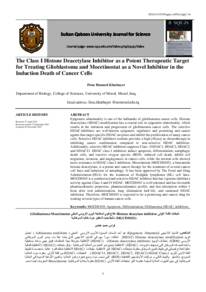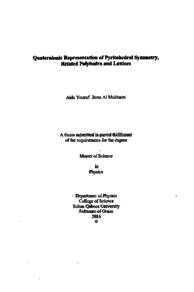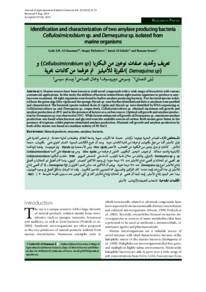وثيقة
The Class I histone deacetylase inhibitor as a potent therapeutic target for treating glioblastoma and mocetinostat as a novel inhibitor in the induction death of cancer cells.
المعرف
DOI:10.53539/squjs.vol29iss1pp1-14
المصدر
Sultan Qaboos University Journal for Science. v. 29, no. 1, p. 1-14.
الدولة
Oman.
مكان النشر
Muscat.
الناشر
College of Science, Sultan Qaboos University.
ميلادي
2024-04-24
اللغة
الأنجليزية
الملخص الإنجليزي
Epigenetic abnormality is one of the hallmarks of glioblastoma cancer cells. Histone deacetylase (HDAC) modification has a crucial role in epigenetic abnormality, which results in the initiation and progression of glioblastoma cancer cells. The selective HDAC inhibitors are well-known epigenetic regulators and promising anti-cancer agents that target specific HDAC enzymes and inhibit the proliferation of many cancer cells. Selective HDAC inhibitors isoform provides a high efficacy as chemotherapy in inhibiting cancer confirmation compared to non-selective HDAC inhibitors. Additionally, selective HDAC inhibitors suppress Class -I HDAC1, HDAC2, HDAC3, and HDAC11. HDAC class I inhibitors induce apoptosis, differentiation, autophagic death cells, and reactive oxygen species (ROS)- induced cell death, inhibit cell migration, invasion, and angiogenesis in cancer cells, while the normal cells showed more resistance to HDAC class I inhibitors. Mocetinostat (MGCD0103), a benzamide histone deacetylase, is a potent anti-cancer therapy for the treatment of several cancer cell lines and induction of autophagy. It has been approved by The Food and Drug Administration (FDA) for the treatment of Hodgkin lymphoma (HL) cell lines. MGCD0103 is a synthesized and selective HDAC inhibitor that has vigorous inhibitory activity against Class-I and IV HDAC. MGCD0103 is well tolerated and has favorable pharmacokinetic properties, pharmacodynamic profile, and fast absorption within 1 hour after oral administration, long elimination half-life, and sustained HDAC inhibition. Therefore, MGCD0103 is expected to be a promising anti-cancer drug for treating several types of human cancer cells.
ISSN
2414-536X
الملخص العربي
يعد الشذوذ اللاجيني أحد السمات المميزة للخلايا السرطانية للورم الأرومي الدبقي. تعديل هيستون دياسيتيلاز (HDAC) له دور حاسم في الشذوذ اللاجيني، مما يؤدي إلى بدء وتطور خلايا سرطان الورم الأرومي الدبقي. مثبطات HDAC الانتقائية هي منظمات جينية معروفة وعوامل واعدة مضادة للسرطان تستهدف إنزيمات HDAC محددة وتمنع تكاثر العديد من الخلايا السرطانية. توفر مثبطات HDAC الانتقائية فعالية عالية مثل العلاج الكيميائي في تثبيط تأكيد السرطان مقارنة بمثبطات HDAC غير الانتقائية. بالإضافة إلى ذلك، تعمل مثبطات HDAC الانتقائية على منع الفئة I HDAC1 وHDAC2 وHDAC3 وHDAC11. تحفز مثبطات HDAC من الفئة الأولى موت الخلايا المبرمج، والتمايز، وخلايا الموت الالتهامية، وأنواع الأكسجين التفاعلية (ROS) - موت الخلايا المستحث، وتمنع هجرة الخلايا، والغزو، وتولد الأوعية في الخلايا السرطانية، بينما أظهرت الخلايا الطبيعية مقاومة أكبر لمثبطات HDAC من الدرجة الأولى. يعد Mocetinostat (MGCD0103)، وهو بنزاميد هيستون دياسيتيلاز، علاجًا قويًا مضادًا للسرطان لعلاج العديد من خطوط الخلايا السرطانية وتحفيز الالتهام الذاتي. تمت الموافقة عليه من قبل إدارة الغذاء والدواء (FDA) لعلاج خطوط خلايا سرطان الغدد الليمفاوية هودجكين (HL). MGCD0103 هو مثبط HDAC مركب وانتقائي له نشاط مثبط قوي ضد الفئتين الأولى والرابع HDAC. MGCD0103 جيد التحمل وله خصائص حركية دوائية مناسبة، وخصائص ديناميكية دوائية، وامتصاص سريع خلال ساعة واحدة بعد تناوله عن طريق الفم، ونصف عمر طويل للتخلص، وتثبيط HDAC مستدام. لذلك، من المتوقع أن يكون MGCD0103 دواءً واعدًا مضادًا للسرطان لعلاج عدة أنواع من الخلايا السرطانية البشرية.
قالب العنصر
مقالات الدوريات



